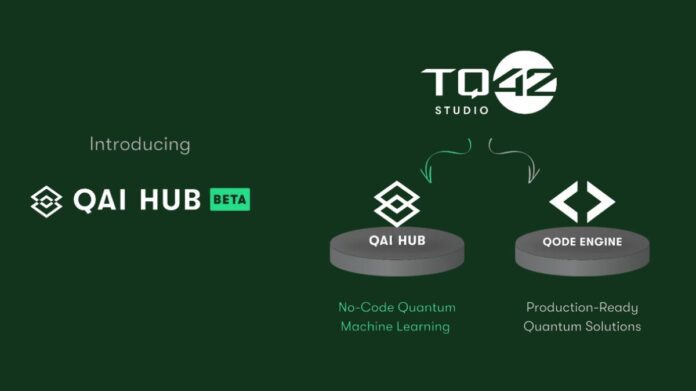Introducing TQ42 Studio’s Closed Beta: Quantum AI Becomes Commonplace with QAI Hub
Rethinking Accessibility and Breaking Down Barriers with a No-Code Quantum ML Milestone in Honour of World Quantum Day
Terra Quantum is launching its TQ42 Studio Closed Beta in honor of World Quantum Day. This ecosystem, which consists of two essential parts, QAI Hub and Qode Engine, is intended to hasten the adoption of quantum AI. The centerpiece of this launch is QAI Hub, a no-code quantum machine learning platform meant to reduce access barriers, even though Qode Engine (Python SDK) supports sophisticated developers.
The Significance of Quantum AI

The Significance of Quantum AI
Even while quantum AI has the potential to revolutionize a variety of fields, like supply chain optimization and industrial forecasting, most teams are still unable to afford it. Adoption is often slowed by specialized knowledge and high coding requirements. Terra Quantum objective with TQ42 Studio is to create opportunities for innovation in quantum AI:
Increase the Generalisation of the Model
Subtle data patterns can be captured by quantum neural networks, creating more adaptable models that can handle the complexity of the actual world.
Encode Data That Is Exponentially Richer
Exploring higher-dimensional characteristics without incurring exponential computing costs is made possible by quantum states’ exponential data encoding possibilities.
Use Smaller Datasets to Get Deeper Understanding
Even with little data, you may quickly find patterns by utilising hybrid quantum-classical layers, which is essential for R&D scenarios.
Provide Predictions That Are More Accurate and Dependable
Quantum machine learning (ML) can improve prediction performance beyond conventional classical methods, from near real-time optimisation to sophisticated forecasting.
To increase accessibility (through no-code), facilitate experiment-driven R&D at less risk, and upskill teams more quickly with (changing) TQ Academy courses, Terra Quantum developed the QAI Hub within TQ42 Studio.
Presenting QAI Hub: Quantum Machine Learning Without Code (Beta)

QAI Hub
Terra Quantum’s no-code platform, QAI Hub, makes it simple to prototype quantum-enhanced AI models. It’s ideal for teams that want to evaluate ideas and develop quantum abilities without having to deal with complicated code. QAI Hub is currently developing since it is in beta, and it values your feedback as it strives to make quantum AI available to all.
Try out the QAI Hub in beta.
Quantum ML that is accessible
Creating hybrid quantum-classical models is simple and requires no quantum knowledge. Utilise the TQml tools included in QAI Hub to take use of our potent Hybrid Quantum Neural Networks (HQNNs).
Read more on The power of Quantum Neural Networks (QNN)
Model Builder Without Code
It has never been so simple to use quantum neural networks! Without knowing any code, you can construct and train your QML model in 5 simple visual steps, starting with automatic data processing.
Hybrid Compute Flexibility
Use HPC resources (CPUs, GPUs) and forthcoming QPU access to experiment with quantum machine learning. This approach is appropriate for concept validation and prototyping.
Agentic AI Assistance
Your conversational AI assistant, TQ Copilot, handles the labour-intensive tasks of model design and tuning. Let TQai take care of the quantum neural networks while you concentrate on your objectives.
Integration with TQ Academy
Get access to Terra Quantum’s specialists’ early learning resources; additional in-depth courses will be released in later versions.
How does QAI Hub work?
Five simple steps to build, fine-tune, and execute quantum machine learning models:
- Data Preparation: Use automated tools to safely import and prepare your data.
- Model Creation: Create quantum-classical models using the visual interface and TQ Copilot support.
- Execution: Your models will run smoothly on CPUs, GPUs, and QPUs.
- Evaluation & Optimization: Use automated hyperparameter tuning and sophisticated evaluation tools to improve your models.
- Prediction & Scaling: Produce accurate forecasts and expand your fruitful trials to deployments at the corporate level.
Quantum AI’s Promise
- Increase the generalisation of the model
- Encode data that is progressively richer.
- Obtain more profound understanding from tiny datasets
- Make predictions that are more trustworthy and accurate.
Qode Engine: Enhanced Developer Control with Python SDK
A powerful Python SDK for incorporating quantum-enhanced operations into enterprise infrastructures is offered by Qode Engine to developers and data scientists. The underlying infrastructure of Qode Engine is built to grow, from early prototypes to production-grade solutions, even if it is currently in beta.
The Benefits of Qode Engine
Advanced Algorithms for Quantum
- Optimization: Use TetraOpt, TQoptimaX, ClearVu Analytics, QuEnc, and TQrouting to effectively handle challenging optimisation problems.
- Quantum Machine Learning: Use TQml to improve analytical depth and prediction accuracy.
Strong Python SDKs and APIs
- The creation of quantum models is streamlined by thorough documentation and APIs.
- Quickly optimize and refine quantum models while integrating them completely into your current Python-based workflow.
Adaptable, Hybrid Implementation
- For optimal performance and cost-effectiveness, combine CPUs, GPUs, and (soon) Quantum Processing Units (QPUs).
- Easily deploy on-premises or in the cloud (AWS, Azure, Google Cloud) while coordinating with your current infrastructure.
Read more on What is a quantum processor? How it works
Developing a Secure, Compliant Framework
- Because Qode Engine is based on enterprise-grade design, security standards are adhered to.
- OIDC/OAuth2 authentication is supported by customizable Role-based Access Control (RBAC) and Relationship-based Access Control (ReBAC).
Which SDK Libraries Are Available?
The Qode Engine Python SDK provides access to TetraOpt, TQoptimaX, ClearVu Analytics, QuEnc, TQrouting (for optimisation), and TQml (for quantum machine learning) algorithms.
How does Qode Engine work?
Through a powerful Python SDK, it facilitates the smooth integration of quantum-enhanced operations into enterprise infrastructures by developers and data scientists.
Workflow: The following actions are part of the standard Qode Engine workflow:
- Users have the option to manually prepare or retrieve data from their current systems through data ingestion.
- Model Development: Workflows for quantum machine learning or optimization are designed, tested, and fine-tuned using the Python SDK.
- High-Performance Computing (HPC) resources, including CPUs and GPUs, are used to perform the solutions; in the future, a few QPUs will be added.


